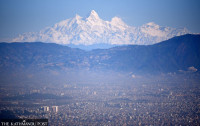Climate & Environment
Pakistan’s Punjab bans entry to parks, zoos and playgrounds because of pollution
Air quality in Lahore has deteriorated drastically, earning Punjab’s regional capital the rank of world’s most polluted city from Swiss air purification equipment maker IQAir.
Reuters
Pakistan’s eastern Punjab province banned entry to parks, zoos, playgrounds and other public spaces on Friday to protect the public from polluted air, and is considering closing down universities after shutting schools earlier this week.
The air quality in Lahore has deteriorated drastically, earning Punjab’s regional capital the rank of world’s most polluted city from Swiss air purification equipment maker IQAir.
“We are closely monitoring the situation. There’s a possibility of closing universities and colleges on Monday to reduce vehicle emissions,” said Jahangir Anwar, Secretary of the Environment Protection Department Punjab.
Friday’s order from the regional government placed a “complete ban on public entry in all parks ... zoos, playgrounds, historical places, monuments, museums and joy/play lands” until November 17 in areas including Lahore.
In addition to shutting schools, the province has already taken other steps such as suggesting half of employees work from home and banning rickshaws in certain areas.
South Asia annually faces severe pollution due to trapped dust, emissions and stubble burning - the practice of setting fire to fields after the harvest of grain.
Punjab has attributed this year’s particularly high pollution levels to toxic air from neighbouring India, where air quality has also reached hazardous levels.
Punjab has set up a “smog war room,” using satellite, drone technology and AI to monitor and address pollution.
Nevertheless, Anwar says there is not enough equipment to effectively monitor the province, with only four air quality monitoring machines for the entire city of Lahore, “whereas we should have 50”.
Anwar said the department had imported and deployed five mobile monitoring units and plans to deploy eight more by year-end.
Ahmad Rafay Alam, an environment lawyer and member of the Pakistan Climate Change Council, stressed the need for robust data and policy changes.
“Right now, we just simply don't have those monitors, we simply don’t have as robust data as we should have to make decisions,” Alam said.
He warned that without addressing fuel quality, renewable electricity and industrial emissions, the problem will continue to worsen.




 8.84°C Kathmandu
8.84°C Kathmandu










